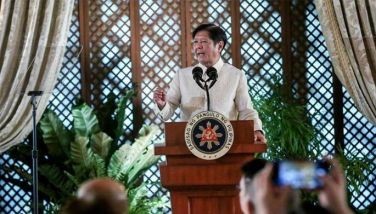Mindanao leaders urge Congress to pass anti-terrorism measure
October 20, 2006 | 12:00am
Mindanao leaders are calling on Congress to pass the long-pending anti-terrorism bill amid heightened threats of attacks from extremist groups in highly populated centers.
While local governments in the South have drawn up their respective counter-terrorism plans, North Cotabato Gov. Emmanuel Piñol, who chairs the Regional Peace and Order Council in Central Mindanao, said yesterday they cannot fully and effectively put them in place because there is no appropriate law that could give them more legal muscle to detain suspected terrorists for a longer period.
"The war on terrorism is being hampered by the absence of a tougher law against this global scourge, and this is due in large part to the failure of the Senate to pass its own version of the measure," Piñol said.
"This undue delay in passing the anti-terrorism bill under our two-chamber legislative setup best illustrates the urgency for a switch from the gridlock-prone bicameral presidential system to a unicameral, parliamentary system," he said.
Piñol added: "The threat of terrorism is not just imagined or something straight from the movies; it is real. We must act now and work together in combating this international menace, and the Senate can certainly do its part in this global effort by acting promptly on the anti-terrorism bill."
Piñol, immediate past president of the Confederation of Mindanao Governors and Mayors, said the need to swiftly enact an anti-terrorism law has been made even more urgent following the spate of bombings in Central Mindanao recently, that left eight people dead and 30 others wounded.
The bombings were believed to be the handiwork of extremists allied with the terrorist groups al-Qaeda and Jemaah Islamiyah.
Despite clear warnings from American, British and Australian intelligence authorities, Congress adjourned last weekend for its three-week Halloween break without passing the anti-terrorism bill.
"Instead of recognizing this urgency, certain opposition senators have even chosen to dilly-dally and delay the congressional passage of the anti-terrorism bill, which demonstrates the pointlessness of having two legislative chambers doing the redundant task of passing bills and conducting public hearings on the same concerns," Piñol said.
Under a parliamentary system, Piñol said the executive and legislative branches of government are fused into one collegial body called the Parliament.
"This single-chamber setup will facilitate the swift passage of urgent legislative measures that would otherwise be left unacted upon under a bicameral system, where bills undergo the tedious and repetitive process of scrutiny by two houses of Congress," he said.
Mindanao, together with the rest of the country, according to Piñol, has remained extremely vulnerable to terrorist attacks largely because of the perennial executive-legislative deadlocks that have saddled the country’s bicameral system.
He said such gridlocks are among the reasons why Sigaw ng Bayan spokesman Raul Lambino and Bohol Gov. Erico Aumentado of the Union of Local Authorities of the Philippines filed last Aug. 25 with the Commission on Elections (Comelec), on behalf of 6.3 million verified signatories, a petition seeking a people’s initiative to amend the Constitution by switching to a unicameral, parliamentary government.
Last Sept. 4, the petitioners asked the Supreme Court (SC) to nullify the poll body’s dismissal of their petition.
They also asked the SC to order the Comelec to schedule within 60 to 90 days a plebiscite to ratify their proposed shift to a parliamentary setup.
While local governments in the South have drawn up their respective counter-terrorism plans, North Cotabato Gov. Emmanuel Piñol, who chairs the Regional Peace and Order Council in Central Mindanao, said yesterday they cannot fully and effectively put them in place because there is no appropriate law that could give them more legal muscle to detain suspected terrorists for a longer period.
"The war on terrorism is being hampered by the absence of a tougher law against this global scourge, and this is due in large part to the failure of the Senate to pass its own version of the measure," Piñol said.
"This undue delay in passing the anti-terrorism bill under our two-chamber legislative setup best illustrates the urgency for a switch from the gridlock-prone bicameral presidential system to a unicameral, parliamentary system," he said.
Piñol added: "The threat of terrorism is not just imagined or something straight from the movies; it is real. We must act now and work together in combating this international menace, and the Senate can certainly do its part in this global effort by acting promptly on the anti-terrorism bill."
Piñol, immediate past president of the Confederation of Mindanao Governors and Mayors, said the need to swiftly enact an anti-terrorism law has been made even more urgent following the spate of bombings in Central Mindanao recently, that left eight people dead and 30 others wounded.
The bombings were believed to be the handiwork of extremists allied with the terrorist groups al-Qaeda and Jemaah Islamiyah.
Despite clear warnings from American, British and Australian intelligence authorities, Congress adjourned last weekend for its three-week Halloween break without passing the anti-terrorism bill.
"Instead of recognizing this urgency, certain opposition senators have even chosen to dilly-dally and delay the congressional passage of the anti-terrorism bill, which demonstrates the pointlessness of having two legislative chambers doing the redundant task of passing bills and conducting public hearings on the same concerns," Piñol said.
Under a parliamentary system, Piñol said the executive and legislative branches of government are fused into one collegial body called the Parliament.
"This single-chamber setup will facilitate the swift passage of urgent legislative measures that would otherwise be left unacted upon under a bicameral system, where bills undergo the tedious and repetitive process of scrutiny by two houses of Congress," he said.
Mindanao, together with the rest of the country, according to Piñol, has remained extremely vulnerable to terrorist attacks largely because of the perennial executive-legislative deadlocks that have saddled the country’s bicameral system.
He said such gridlocks are among the reasons why Sigaw ng Bayan spokesman Raul Lambino and Bohol Gov. Erico Aumentado of the Union of Local Authorities of the Philippines filed last Aug. 25 with the Commission on Elections (Comelec), on behalf of 6.3 million verified signatories, a petition seeking a people’s initiative to amend the Constitution by switching to a unicameral, parliamentary government.
Last Sept. 4, the petitioners asked the Supreme Court (SC) to nullify the poll body’s dismissal of their petition.
They also asked the SC to order the Comelec to schedule within 60 to 90 days a plebiscite to ratify their proposed shift to a parliamentary setup.
BrandSpace Articles
<
>
- Latest
- Trending
Trending
Latest
Trending
Latest
Recommended






























